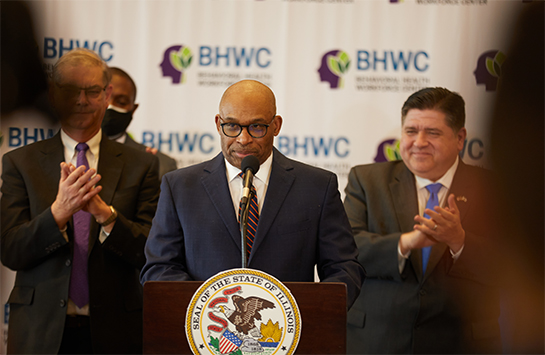Support Staff

JACSW, UIC Playing Critical Role in Boosting State’s Behavioral Health Workforce
The state of Illinois is facing a critical shortage of behavioral health care providers, but through a new statewide initiative that the University of Illinois Chicago’s Jane Addams College of Social Work is collaborating on, the capacity of the behavioral health workforce will increase.
Illinois Gov. JB Pritzker announced in 2023 the formation of the Illinois Behavioral Health Workforce Center, a joint initiative of the state’s Department of Human Services and the Illinois Board of Higher Education that will address the shortfall. Southern Illinois University School of Medicine (SIU SOM) will serve as the primary administrative hub in Springfield, providing coordination and support for building the behavioral health workforce pipeline and increasing entry into the field. The University of Illinois Chicago will serve as the secondary hub, supporting specific data collection and training initiatives.
“From care portals and universal screenings to improved coordination of service delivery and increased statewide capacity, we are laying out a plan to build the best behavioral health system in the nation,” Pritzker said at the press conference announcing the Center.
State lawmakers sounded an alarm about the staffing shortages in a unanimous 2018 resolution. The following year the Behavioral Health Workforce Education Center Task Force, chaired by JACSW adjunct faculty member Marvin Lindsey, MSW, issued a final report recommending the creation of a hub-and-spoke center to address unmet mental and behavioral health needs. The center will begin with a $5 million annual investment from the Department of Human Services.
Article continues

“We’re excited to have this opportunity to understand the needs of the behavioral health workforce and support their training and career development,” said JACSW Professor Sonya Leathers, PhD, who serves as director of UIC’s Center activities. “We hope to increase access to effective services through initiatives that will provide critically needed support and training for behavioral health providers in a range of traditional and nontraditional settings.”
“We have been facing a workforce crisis in mental health for years due to a shortage of behavioral health specialists,” said Dr. Kari Wolf, chair of psychiatry at Southern Illinois University’s School of Medicine and CEO of the Behavioral Health Workforce Center. “Local staffing levels were already critical in rural and small urban communities, and the pandemic made matters worse globally, with a 25 percent increase in people seeking mental health care. Through the Center, we aim to assess current educational pathways and create additional training opportunities to develop a diverse behavioral health workforce that is distributed across the entire state.”
Addressing the gaps
Due to the shortage of behavioral health care workers, Illinois ranks among the bottom half of states in Mental Health America’s rating for access to mental health care.
“Across Illinois, services are particularly lacking in rural and low- to middle-income areas,” Leathers said. “The current waitlist times to access services is frequently several months or longer, with some agencies reporting they have closed their waitlists. In urban, low income areas, difficulty in obtaining adequate behavioral health treatment compounds racial inequities in health care outcomes.”
Adults suffering from substance abuse, particularly opioid use disorder, are at an increased risk of death in Illinois. In preliminary data released in January 2023, the Cook County Medical Examiner’s Office recorded more than 1,500 deaths from opioid abuse in 2022, and that number was expected to rise by about 400 to 500, as toxicology reports were not complete. The final figure – more than 2,000 – would eclipse 2021’s record for opioid abuse deaths. Seventy eight percent of the deaths were male, and 71% being of people of color. Primary care professionals and community workers can play a key role in addressing substance abuse needs, but additional training and support is needed to increase accessible services, Leathers said.
Additional areas needing support include training and professional development opportunities for individuals in entry level behavioral health positions, effective supervision models, services for culturally diverse children and families, access to psychiatric care, especially in rural areas, and services for clients who primarily speak Spanish, she said. To increase access to services, the Center will focus on supporting the development of behavioral health services in untraditional settings such as primary care and community locations.
Leathers quote
Across Illinois, services are particularly lacking in rural and low- to middle-income areas.
Article continues

Understanding the needs of behavioral health providers and initiating training programs has been the Center’s focus in its first year. A survey of more than 500 community mental health providers supported the interest and need for training in a variety of areas. Survey data and advisory groups reinforced the need for increased support for supervision training and services to improve service quality and support staff retention.
“As one advisory group member aptly stated, ‘The lack of supervision or leadership on how to deal with scenarios that come up, that’s where it all falls apart and leads to turnover,” Leathers said. The Center addressed this need by creating an initiative to support supervision training and direct provision of supervision in areas with a critical shortage of licensed providers.
The Center is also focusing on expanding integrated care to support greater access to behavioral health services. This, Leathers said, will provide short-term behavioral health services in primary care clinics. The Center’s Integrated Care Initiative selected solution-focused therapy (SFT) as an intervention for dissemination in integrated care settings and will support SFT’s training over the next year.
Article continues
In a secondary project, the Center has focused on increasing access to mental health services for children and teens who are particularly affected by the shortage of trained clinicians to meet mental health needs that have increased since the pandemic. The Parent Support Initiative is expanding certification programs to increase the staffing and support of the Chicago Parent Project, an evidence-based intervention to improve child behavioral health outcomes. Community-based non-profit organization have expanded their capacity to support parenting strategies that reduce children’s behavioral problems. The project will continue to support provider training across Illinois throughout the next year.
UIC’s Center for Mental Health Services, Research and Policy (CMHSRP) collaborators have also initiated training to service providers who assist individuals with serious mental illness (SMI). Motivational interviewing and online seminar training on cooccurring diabetes and SMI will provide greater support to clients who are disproportionately affected by chronic health conditions. A survey was initiated with social service providers in this area to identify other training most needed to improve the service community’s capacity to meet the needs of people with SMI.
Throughout the next several months, public and independent universities and community colleges across all regions of the state will be invited to participate as Center partners to increase the statewide impact. All consortium members will coordinate programs and oversee initiatives to increase the behavioral health care workforce and its capacity to provide high-quality behavioral health services.